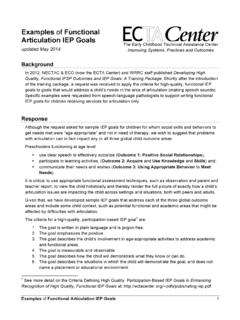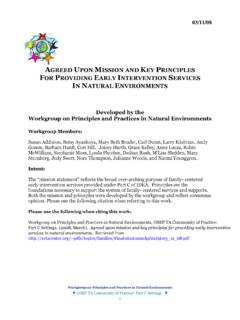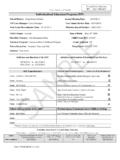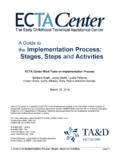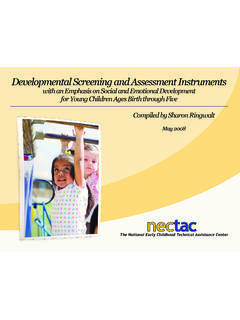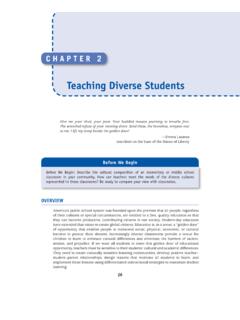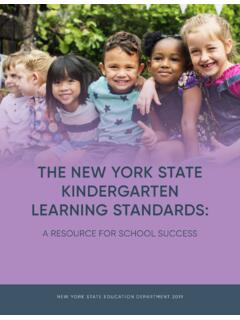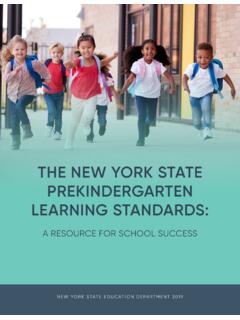Transcription of Writing Quality IFSP Outcomes/ IEP Goals
1 Writing Quality IFSP Outcomes/ IEP Goals andLinking to the Global Child OutcomesKathi Gillaspy, NECTACAnne Lucas, NECTAC/WRRCMary Peters, NECTAC1 Session PurposeUnderstand the connection between functional assessment, 3 global child outcomes, and developing meaningful IFSP outcomes and IEP goals2 MeaningfulIFSP outcomes & IEP Goals 3 global child outcomesFunctional Assessment Functional Assessment: Linking with 3 Global Child Outcomes and Functional IFSPs and IEPs Activity: Nolan s Video/Global Outcomes Functional IFSP Outcomes/ IEP Goals Activity: Rating IFSP Outcomes/ IEP Goals Wrap Up Discussion3 Session OutlineUsing Functional Assessmentfor 3 Global Child Outcomes and Functional IFSPs/ IEPs4 MeaningfulIFSP outcomes & IEP Goals 3 global child outcomesFunctional AssessmentHow Children LearnChildren learn and develop best when: Participating in natural learning opportunities that occur in everyday routines and activities of children and families and as part family and community life Interested and engaged in an activity, which in turn strengthens and promotes competency and mastery of skills.
2 (Dunst, Bruder, Trivette, Raab & McLean, 2001;Shelden & Rush, 2001)5 Learning ActivitiesInterestsExplorationand MasteryEngagementCompetenceContext for Learning: Child Interest and Competence (Dunst, Herter & Shields, 2000) Assessment of the young child s skills in the real life contexts of family, culture and community rather than discrete isolated tasks irrelevant to daily WHAT is Functional Assessment? the science of the strange behavior of children, with strange adults, in strange settings for the briefest possible period of time. Bronfenbrenner, 1979, p. 19 WHAT: Functional Assessment contextually relevant information about the child s strengths and needs more culturally sensitive individually focusedIS domain based and discipline specific deficit driven threatening 8 The more realistic or natural the task, the more motivated the child the more applicable it is to everyday events and situations authentic tasks and circumstances reinforce competency-based approach to the education of young children assessment of all disciplines across complex skills and processes generalization of learning across settings authentic tasks require the assessor to make no inferences about a child's capabilities, because the behaviors sampled are directly observable.
3 University of Illinois at Chicago9 WHAT: Functional Assessment is Why is Functional Fundamental? Guides identification of FUNCTIONAL individualized Goals /outcomes Yields a real picture of the child 103. Who Does IT? Families and familiar, knowledgeable caregiversinthe child s life Providers Teachers Others, less familiar, can also contribute114. When is ITDone? Over time One-time observations even in the natural context, are insufficient and often misleading (Bagnato, Neisworth, Pretti-Frontczak, 2010)125. How is ITDone? Knowing the purpose is important Observation is essential Keep a focus on being objective vs. subjective Record keeping is key Qualitative Quantitative Hearing from others who know the child is critical involve families!13 HOW: Involving More than asking questions, or going over questionnaires, and developmental profiles Listening to the family story and hearing about the child s engagement, independence, and social relationships with various day-to-day routines and activities Asking parents to show or describe Observing how the parent engages the child Setting up play scenarios1415 HOW: Asking Questions Related to Everyday Activities and Can you tell me about your day?
4 What types of things happen on most mornings? Afternoons? Nights? Weekends? Where do you and your child spend time? What types of things or activities do you and your child like to do ( , hiking, going on picnics, paying games at home)? What things or activities do you and your child have to do on a regular basis ( , go to the store, give kids a bath, feed the horses, prepare meals, walk the dog)? What are activities that you and your child have to do? What are your child s interests? What things does your child enjoy and what holds your child s attention? ( , people, places, things such as toys, dog, being outside) What makes your child happy, laugh and/or smile? What routines and/or activities do your child not like? What makes this routine and/or activity difficult and uncomfortable for your child? What does your child usually do during the routine/activity?
5 Who are key family members, other caregivers, or important people who spend time with your child and in what settings does this occur? Are there activities that you used to do before your child was born that you would like to do again? Are there new activities that you and your child would like to try? Are there any activities or places that you go ( , doctor s appointments, visiting grandparents) that occur on a less regular basis ( , once a week)?16 Identify Learning OpportunitiesImprove Functional AbilitiesSocial RelationsEngagementIndependenceEmploy StrategiesEnhance LearningOpportunitiesRoutines/Activities going wellRoutines/Activities not going wellHinderingFactorsHelpingFactorsEmploy StrategiesImprove RoutinePromote Social RelationsEngagementIndependencePip CampbellHOW: Gathering Relevant Onlyin the children s natural everyday settings, activities, and routines176.
6 WHERE is IT Done?Linking Information Gathering to IFSP Outcomes / IEP GoalsUNDERSTAND how to gather information and conduct the functional assessment .. what s working and challenging in everyday activities .. how to use this information to develop IFSP Outcomes/ IEP goalsBELIEVE that child learn best through participation in everyday activities18 MeaningfulIFSP outcomes & IEP Goals 3 global child outcomesFunctional Assessment19 Key Steps: IFSP/IEP Process Must Meet All TimelinesBeginning with initial contacts and referralGathering Information from parents and caregiversEvaluation and functional assessmentDeveloping IFSPs and IEPs 20 Using Information within the IFSP/IEP ProcessInfo from IFSP/IEP processDetermine Eligibility Develop Outcomes/ GoalsSelect Routines, Activities SettingsDevelop Strategies/ObjectivesDetermine People and Resources (Services)Determine Frequency and IntensityDetermine Criteria to Measure ProgressFamily hopes Family concerns priorities Family resources Child needs Child strengths Child interests Behaviors in Settings Desired activities MeaningfulIFSP outcomes & IEP Goals 3 global child outcomesFunctional Assessment21 Video Activity.
7 Nolan s Story3 Global social-emotional skills (including social relationships) and use of knowledge and skills (including early language/ communication [and early literacy]) of appropriate behaviors to meet their needs22 Functional IFSP Outcomes and IEP Goals23 Using information to Develop Outcomes/ Goals Start with parent s/caregiver s priorities about child s learning/development and/or family s needs (hopes for their child and/or family s participation), not the interventionists /teachers priorities Consider what s working in everyday routines and activities24 IFSP Outcomes IFSP outcomes: What would your family like to see happen for your child/family? 2 types of outcomes Child Outcomes Family Outcomes (participation-based or resource based)Washington Systems Improvement Project2526 Developing OutcomesStep 1:Determine the functional area(s)Eating and chewing Step 2:What routine(s) does this affect?
8 Meal time ( , lunch, dinner, restaurant )Step 3:Child will participate in (routines in question) Alicia will participate in lunch, dinner, and restaurant .. Step 4: by ---ing (address specific behaviors) .. chewing her food Child Outcomes: ExamplesNot This Romeo will improve muscle tone for sitting"This"Romeo will play with toys and eat meals with his family by sitting without much support 27 Family OutcomesWhat Parent States: We want to be able to takeRomeo with us in the car; we need atravel car seat 28 Family Outcomes: ExamplesThis Karen and Mark will learn about resources and low cost options so they can obtain a car seat. Not This Staff will explore options for financial assistance for travel chairs 29 IEP Goals IEP Goals : What will the child need to do to be successful in learning and real life activities?
9 Focus on academic activities of a child this age functional 3031 Developing IEP GoalsStep 1:Determine the academic (preschool activities) and functional area(s)Making choicesStep 2:What routine(s) does this affect? Play Step 3:Child will participate in (routines in question) Alicia will make choices during play each day Step 4: by ---ing (address specific behaviors) .. by pointing at what she wants IEP Goals : ExampleThis At least once during a play each day, Tamara will demonstrate her choice by pointing at a toy she wants when presented with options Not This Tamara will make choices 3233 Activity:Rating IFSP Outcomes and IEP GoalsMeaningfulIFSP outcomes & IEP Goals 3 global child outcomesFunctional AssessmentThe wording of the statement is jargon-free, clear and statement avoids the use of passive words ( , tolerate, receive, improve, maintain).
10 The outcome is outcome statement is necessary and functional for the child s and family s for Rating IFSP OutcomesThe wording emphasizes the statement reflects real-life contextualized settings ( , not test items).When the child s contextual information is available, the following IFSP outcome criteria can also be evaluated: outcome is based on the family s priorities and outcome describes both the child s strengths and needs based on information from the initial evaluation or ongoing wording of the statement is jargon-free, clear and statement avoids the use of passive words ( , tolerate, receive, improve, maintain).The outcome is outcome statement is necessary and functional for the child s and family s for Rating IFSP OutcomesThe wording emphasizes the statement reflects real-life contextualized settings ( , not test items).
